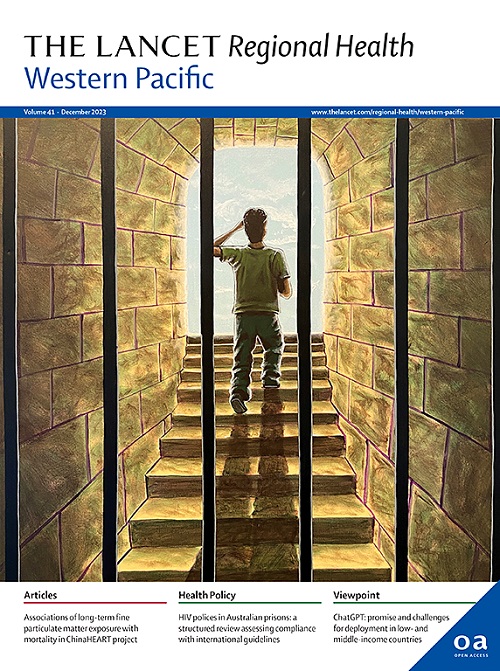The long-term impact of COVID-19 on mental health and the moderation effect of sex and loneliness amongst resettled refugees: findings from BNLA cohort study
IF 7.6
1区 医学
Q1 HEALTH CARE SCIENCES & SERVICES
引用次数: 0
Abstract
Background
Vulnerability to mental health problems is well-established in refugees, attributed to the interplay between pre-and post-migration stressors. COVID-19 pandemic was recognized as a universal stressor with potential to further impact refugees’ mental health. This longitudinal study sought to investigate the mental health impact of COVID-19 and its moderators in resettled refugees in Australia.
Methods
Data from Waves 1 (2013–2014, pre-pandemic), 5 (2017–2018, pre-pandemic) and 6 (2023, post-pandemic) of the Building a New Life in Australia were utilized in this study. High risk of severe mental illness (HR-SMI) and post-traumatic stress disorder (PTSD) were measured by K6 and PTSD-8 scales. Using generalized linear mixed model, we examined the mental health impacts of COVID-19 pandemic and moderation effect of sex and loneliness. The difference in changes in predicted probability of HR-SMI and PTSD across Waves 1 to 5 and Waves 5 to 6 between moderator-based subgroups were calculated.
Findings
A total of 2399 resettled refugees participated. The weighted prevalence of HR-SMI (Δ6-5 5.0%) or PTSD (Δ6-5 3.2%) was increased after the pandemic, different from the trend from Waves 1 to 5 (HR-SMI stable trend; PTSD decreased trend). Compared to Wave 5, Wave 6 had a significant effect on HR-SMI (AOR 1.54 [95% CI 1.17–2.04]), especially among females (2.04 [95% CI 1.16–3.56]); causing an additional 8.82% change in predicted probability than males. A significant effect of Wave 6 on PTSD was only found in respondents with loneliness (2.17 [95% CI 1.17–4.05]), causing an additional 14.92% change in predicted probability than those without loneliness.
Interpretation
Rates of mental illness increased among resettled refugees in Australia from prepandemic to four years post-COVID-19 and were moderated by loneliness and being female. This highlights the need for ongoing, targeted psycho-social support for specific refugee sub-groups.
Funding
Guangdong Basic and Applied Basic Research Foundation (2022B1515020094).
COVID-19对重新安置难民心理健康的长期影响以及性别和孤独感的调节作用:来自BNLA队列研究的结果
背景:由于移民前和移民后压力因素之间的相互作用,难民容易受到心理健康问题的影响是众所周知的。2019冠状病毒病大流行被认为是一个普遍的压力源,有可能进一步影响难民的心理健康。这项纵向研究旨在调查COVID-19对澳大利亚重新安置难民的心理健康影响及其调节因素。方法本研究利用澳大利亚“建设新生活”第1期(2013-2014年,大流行前)、第5期(2017-2018年,大流行前)和第6期(2023年,大流行后)的数据。采用K6和PTSD-8量表对重度精神疾病(HR-SMI)和创伤后应激障碍(PTSD)的高危性进行测量。采用广义线性混合模型,研究了COVID-19大流行对心理健康的影响以及性别和孤独感的调节作用。计算基于适度者的亚组在第1 - 5波和第5 - 6波中HR-SMI和PTSD预测概率变化的差异。调查结果共有2399名重新安置难民参与。大流行后HR-SMI (Δ6-5 5.0%)或PTSD (Δ6-5 3.2%)的加权患病率增加,不同于第1 -5波的趋势(HR-SMI稳定趋势;PTSD呈下降趋势)。与第5波相比,第6波对HR-SMI有显著影响(AOR 1.54 [95% CI 1.17-2.04]),尤其是女性(2.04 [95% CI 1.16-3.56]);导致预测概率比男性多8.82%的变化。第6波对PTSD的显著影响仅在有孤独感的受访者中发现(2.17 [95% CI 1.17-4.05]),与没有孤独感的受访者相比,其预测概率增加了14.92%。从大流行前到2019冠状病毒病后四年,澳大利亚重新安置的难民中精神疾病的发病率有所上升,孤独感和女性身份降低了这一比例。这突出表明需要为特定难民群体提供持续的、有针对性的心理社会支助。广东省基础与应用基础研究基金(2022B1515020094)。
本文章由计算机程序翻译,如有差异,请以英文原文为准。
求助全文
约1分钟内获得全文
求助全文
来源期刊

The Lancet Regional Health: Western Pacific
Medicine-Pediatrics, Perinatology and Child Health
CiteScore
8.80
自引率
2.80%
发文量
305
审稿时长
11 weeks
期刊介绍:
The Lancet Regional Health – Western Pacific, a gold open access journal, is an integral part of The Lancet's global initiative advocating for healthcare quality and access worldwide. It aims to advance clinical practice and health policy in the Western Pacific region, contributing to enhanced health outcomes. The journal publishes high-quality original research shedding light on clinical practice and health policy in the region. It also includes reviews, commentaries, and opinion pieces covering diverse regional health topics, such as infectious diseases, non-communicable diseases, child and adolescent health, maternal and reproductive health, aging health, mental health, the health workforce and systems, and health policy.
 求助内容:
求助内容: 应助结果提醒方式:
应助结果提醒方式:


